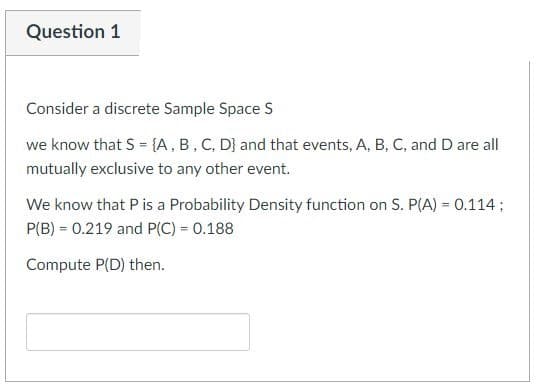Question 1 Consider a discrete Sample Space S we know that S = {A, B, C, D) and that events, A, B, C, and D are all mutually exclusive to any other event. We know that P is a Probability Density function on S. P(A) = 0.114 ; P(B) 0.219 and P(C) = 0.188 Compute P(D) then.
Question 1 Consider a discrete Sample Space S we know that S = {A, B, C, D) and that events, A, B, C, and D are all mutually exclusive to any other event. We know that P is a Probability Density function on S. P(A) = 0.114 ; P(B) 0.219 and P(C) = 0.188 Compute P(D) then.
Algebra & Trigonometry with Analytic Geometry
13th Edition
ISBN:9781133382119
Author:Swokowski
Publisher:Swokowski
Chapter10: Sequences, Series, And Probability
Section10.8: Probability
Problem 46E
Related questions
Question

Transcribed Image Text:Question 1
Consider a discrete Sample Space S
we know that S = {A, B, C, D) and that events, A, B, C, and D are all
mutually exclusive to any other event.
We know that P is a Probability Density function on S. P(A) = 0.114 ;
P(B) = 0.219 and P(C) = 0.188
Compute P(D) then.
Expert Solution
This question has been solved!
Explore an expertly crafted, step-by-step solution for a thorough understanding of key concepts.
Step by step
Solved in 2 steps

Recommended textbooks for you

Algebra & Trigonometry with Analytic Geometry
Algebra
ISBN:
9781133382119
Author:
Swokowski
Publisher:
Cengage

Holt Mcdougal Larson Pre-algebra: Student Edition…
Algebra
ISBN:
9780547587776
Author:
HOLT MCDOUGAL
Publisher:
HOLT MCDOUGAL

Functions and Change: A Modeling Approach to Coll…
Algebra
ISBN:
9781337111348
Author:
Bruce Crauder, Benny Evans, Alan Noell
Publisher:
Cengage Learning

Algebra & Trigonometry with Analytic Geometry
Algebra
ISBN:
9781133382119
Author:
Swokowski
Publisher:
Cengage

Holt Mcdougal Larson Pre-algebra: Student Edition…
Algebra
ISBN:
9780547587776
Author:
HOLT MCDOUGAL
Publisher:
HOLT MCDOUGAL

Functions and Change: A Modeling Approach to Coll…
Algebra
ISBN:
9781337111348
Author:
Bruce Crauder, Benny Evans, Alan Noell
Publisher:
Cengage Learning